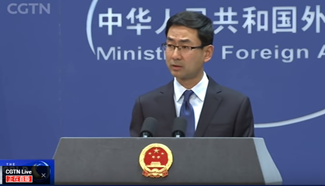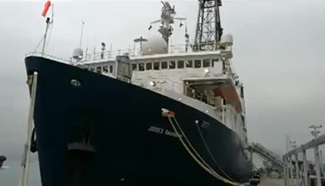BEIJING, Feb. 15 (Xinhua) -- The virtual economy heats up, optimistic sentiment rises, the Federal Reserve (Fed) begins to hike rates, and the market beats the drum for relaxed regulations. Isn't this exactly what was happening before a subprime mortgage crisis broke out ten years ago?
Ten years have elapsed, and analysts are worrying about whether another crisis is in the works in Wall Street and whether the world can handle it better.
GREED OF WALL STREET RETURNS
"Greed is a powerful force. We are trying not to forget that," Andrew Sheets, a credit strategist at Morgan Stanley, wrote in a recent note, comparing the current market situation to the early days of 2007 and warning of a resurgence of greed.
Since Donald Trump won the presidential election on Nov. 8, the U.S. stock market has been hitting a record high, with the S&P 500 rising nearly 9.3 percent.
Wall Street analysts believe that the current behavior of U.S. stocks, instead of mirroring the real economy, is a "wager" on the Trump administration's new moves like tax cuts, spending hikes and relaxed regulations.
Yet, U.S. growth was merely 1.6 percent last year, lower than 2.6 percent in the previous year. With the state of the real economy unclear and the virtual one that hot, the asset bubbles could burst anytime.
This scenario looks quite familiar, as Sheets warned "how often do greedy markets care about valuations?"
Meanwhile, the Fed raised interest rates in December for just the second time in a decade, with three hikes more expected this year. The Fed's continuous rate hikes might trigger a mortgage crisis again as it did before.
The Fed's rate hikes will increase the cost of funds and restrain investment. In the past, financial crises were likely to occur when the Fed kept raising interest rates, for example, the outbreak of the Asian financial crisis in 1997 and the emergence of the mortgage crisis in 2008.
In addition, Trump's possible move to relax regulations will also bring some new risks.
Blind optimism, the Fed's continuous rate hikes and other improper policies are likely to bring about a new round of "perfect storms." Even the most optimistic analysts in Wall Street have to admit that a mid- and long-term risk is building up rapidly, even if no systematically financial crisis occurs in the United States in the short term.
STRUCTURAL PROBLEMS STILL EXIST
Similar to the previous mortgage crisis, the current behavior of the U.S. stock market is due to the "rotating funds" inside the financial market, which are not invested into the real economy.
Nearly 10 years after the subprime mortgage crisis, structural problems still exist in the world economy. The deleveraging process makes slow progress in developed economies which are in the throes of low growth, low inflation and low interest rates.
Meanwhile, high leverages in companies in emerging economies further add to the vulnerability. The huge liquidity in the current financial system temporarily shields the risk of monetary and capital bubbles, said Guo Shengxiang, president of Australia's Academy of APEC Creative Finance.
Although it postpones the risk, it does not take away the risk, he said.
In addition, the gaming and differentiation of monetary polices of the world's major economies in the "post-crisis era" will have an impact on global capital liquidity, intensifying disturbances in the global financial market and weakening the global economy's capacity to withstand unexpected risks.
Moreover, with the rise of protectionism and the resurgence of the anti-globalization trend, any new crisis in the U.S. financial market could easily spread worldwide.
GLOBAL CAPACITY TO COUNTER RISKS STRENGTHENED
The world's capacity to counter risks has been tremendously improved after the global financial turmoil.
First, the U.S. financial regulation system now has become more stable and effective compared to the time when the global economic crisis occurred.
Second, the normalization of global financial supervision and cooperation and the policy coordination regime helps tremendously in supervising financial institutions and controlling newly-emerged risks.
The Basel III agreement, proposed by major world economies after the global financial crisis and aimed at establishing new requirements for financial institutions and increasing their capitalization levels, has been recognized and implemented by most of the world's major economies.
Third, the global economic landscape has undergone enormous changes since the crisis, with the international currency system becoming increasingly diversified.
The IMF officially added the RMB, the Chinese currency, to its special drawing rights (SDR) basket on Oct. 1, 2016 with a weighting of 10.92 percent, just next to the U.S. dollar's 41.73 percent and the euro's 30.93 percent, starting the currency's exciting world journey.
The inclusion of the RMB in the IMF's SDR basket, on the one hand, will enhance the currency's international credibility, benefiting countries, enterprises and individuals.
On the other hand, the inclusion of the RMB -- the only emerging market currency -- in the "world reserve" will help the flawed international currency system monopolized by the U.S. dollar to advance toward a multipolar direction, making it more stable, representative and contemporary.
Related:
Trump's decisions pose "serious risk" to world trade order: French economy minister
PARIS, Jan. 31 (Xinhua) -- The decisions of the U.S. Administration of Donald Trump "pose a serious risk to the world trade order," French Minister of Economy and Finance Michel Sapin said Tuesday.
He made the remarks Tuesday during a conference held in Paris on the subject of commercial openness. Full story
Trump's proposed "border tax" could also hit U.S. economy hard: Finnish minister
HELSINKI, Feb. 2 (Xinhua) -- The consequences of the U.S. president proposed "border tax" would not only be harmful for the world economy, but also hit the U.S. economy itself, Finnish Minister of Foreign Trade and Development Kai Mykkanen said on Thursday.
Last month, U.S. President Donald Trump pressured Ford, General Motors, Toyota and other companies to bring factories back to the United States, threatening to impose a "big border tax" on them if they shift production to Mexico. Full story












